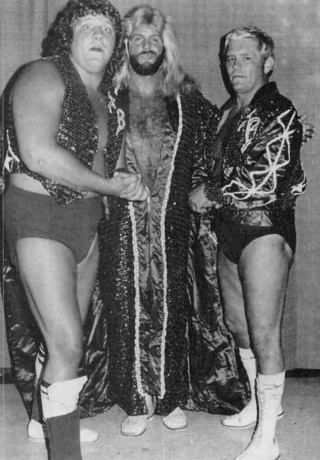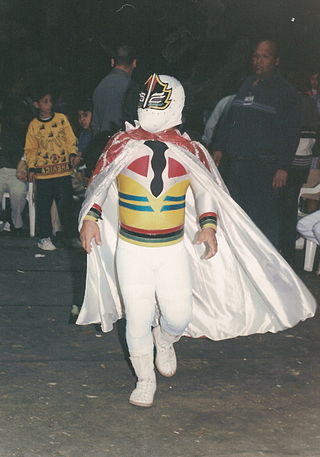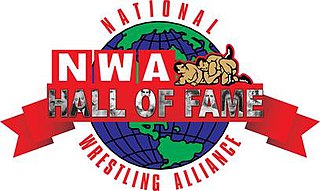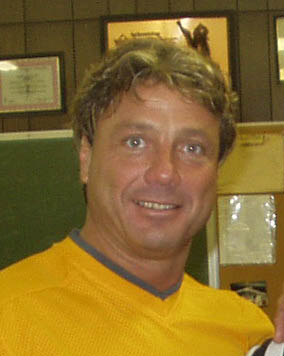Related Research Articles

The Fabulous Freebirds were a professional wrestling tag team who attained fame in the 1980s, performing into the 1990s. The team usually consisted of three wrestlers, although in different situations and points in its history, just two performed under the Freebirds name. The Freebird lineup of Hayes, Roberts, and Gordy was inducted into the Professional Wrestling Hall of Fame in 2015, and members Hayes, Roberts, Gordy, and Garvin were inducted into the WWE Hall of Fame in 2016.

The Central States version of the NWA World Tag Team Championship was the main professional wrestling championship for tag teams in Heart of America Sports Attractions, later known as Central States Wrestling (CSW) from 1951 to 1959, then again from 1962 to 1963 and then finally from 1973 to 1979. CSW was a member of the National Wrestling Alliance (NWA), whose bylaws allowed any of their members, referred to as NWA territories, to create their own version of the NWA World Tag Team Championship that would be promoted within their territory. The Central States version was primarily defended in CSW's home town of Kansas City and during their shows across Missouri, Kansas and Iowa. As it was a professional wrestling championship, it was not won or lost competitively but instead by the decision of the bookers. The title was awarded after the chosen team "wins" a match to maintain the illusion that professional wrestling is a competitive sport. In 1957 there were at least 13 different versions of the NWA World Tag Team Championship being promoted in various NWA territories across the United States.[Championships]

Paul Vachon was a Canadian professional wrestler. He was a member of the Vachon wrestling family. He is perhaps best known by his ring name Butcher Vachon.
The Wrestling Observer Newsletter (WON) Hall of Fame is a professional wrestling and mixed martial arts (MMA) hall of fame that recognizes people who make significant contributions to their professions. It was founded in 1996 by Dave Meltzer, editor of WON. Like many other wrestling halls of fame, such as the WWE, TNA, ROH and WCW halls of fame, WON's Hall of Fame is not contained in a building, and there are no ceremonies for inductions other than a highly detailed biographical documentation of their career in the newsletter. Inductees include wrestlers/fighters, managers, promoters, trainers, and commentators. On select occasions, groups, either tag teams, trios, or quartets, have been inducted rather than the individual members of the group. This first occurred in 1996, when The Fabulous Kangaroos and The Road Warriors entered the hall. The Fabulous Freebirds, The Midnight Express, The Rock 'n' Roll Express, The Assassins, The Holy Demon Army, The Sharpe Brothers, Los Misioneros de la Muerte, and Los Brazos among others all also entered as groups. Occasionally entire wrestling families have been inducted into the hall. This first occurred in 1996 when The Dusek Family entered the hall; in 2022, the five man familial team of Los Villanos was inducted.

Midget wrestling is professional wrestling involving people of exceptionally short stature. Its heyday was in the 1950s and 1960s, when wrestlers such as Little Beaver, Lord Littlebrook, toured North America, and Sky Low Low was the first holder of the National Wrestling Alliance's World Midget Championship. In the following couple of decades, more wrestlers became prominent in North America, including foreign wrestlers like Japan's Little Tokyo.

Eric Henry Edward Tovey, known professionally as Lord Littlebrook, was an English midget wrestler. He enjoyed his greatest success during the 1970s, when he held the NWA World Midget's Championship. He was also part of the Wrestlemania III card in 1987 in front of nearly 78,000 fans at the Pontiac Silverdome in Detroit, then the largest professional wrestling attendance in North American history.

Lionel Giroux was a Canadian professional wrestler, better known by the ring name Little Beaver. He is best known for his appearance in a six-man tag team match at WrestleMania III in 1987.
Léonce Cormier was a Canadian professional wrestler. He was born in Dorchester, New Brunswick. He competed across Canada, in several American promotions, and wrestled internationally for Puerto Rico's World Wrestling Council (WWC) and the National Wrestling Alliance (NWA) in New Zealand. In Canada, where he spent the majority of his career, he used the ring name Leo Burke. In the United States, he competed as Tommy Martin.

Yvon Cormier was a Canadian professional wrestler. Competing primarily under the ring name The Beast, he and his three wrestling brothers made up the Cormier wrestling family. He wrestled in many countries but regularly returned to Canada, where he competed for the Eastern Sports Association (ESA) and the ESA-promoted International Wrestling (IW). He also competed in the Calgary, Alberta-based Stampede Wrestling for many years.

The National Wrestling Alliance (NWA) Hall of Fame is an American professional wrestling hall of fame maintained by the NWA. It was established in 2005 to honor select wrestling personalities, mostly alumni of the NWA. Inductees receive commemorative medals that have their names inscribed on it with the logo of the NWA.
Daniel Kroffat is a Canadian retired professional wrestler. He is best known for his appearances with Stampede Wrestling in the 1960s and 1970s, where he invented the ladder match.

Shigeru Akabane, best known under his ring name Little Tokyo, was a Japanese professional midget wrestler who competed in North American promotions from the 1970s into the 1990s including appearances for American Wrestling Association (AWA), National Wrestling Alliance (NWA) and the World Wrestling Federation, (WWF) most notably appearing at WrestleMania III in a mixed tag team match with Lord Littlebrook and King Kong Bundy against Hillbilly Jim, the Haiti Kid and Little Beaver in 1987. He held the NWA World Midget's Championship on three occasions

The NWA Central States Television Championship was the secondary singles championship for the Heart of America Sports Attractions / Central States Wrestling promotion from 1977 until the promotion ceased to exist in 1988. Because the championship is a professional wrestling championship, it is not won or lost competitively but instead by the decision of the bookers of a wrestling promotion. The championship is awarded after the chosen team "wins" a match to maintain the illusion that professional wrestling is a competitive sport.
The Heart of America Sports Attractions, or "NWA Central States" version of the NWA North American Tag Team Championship was a secondary Tag team championship promoted by the Heart of America Sports Attraction promotion, a National Wrestling Alliance territory based out of Kansas City, Missouri and was defended in Missouri, Kansas and the surrounding states. The Championship was active from 1963 until 1973, originally designed to be a replacement for the NWA Central States Tag Team Championship and after 10 years was replaced with the Central States version of the NWA World Tag Team Championship. Because the championship was a professional wrestling championship, it was not won or lost competitively but instead by the decision of the bookers of a wrestling promotion. The championship was awarded after the chosen team "won" a match to maintain the illusion that professional wrestling is a competitive sport.
The National Wrestling Alliance (NWA) Wrestling Legends Hall of Heroes is a professional wrestling hall of fame that honors people who have competed or played other major roles in the NWA. Organized by wrestling promoter Greg Price, the hall is separate from the NWA Hall of Fame and is not officially endorsed by the company, but the NWA has given permission for the use of its name. An induction ceremony takes place at the annual NWA Legends Fanfest Weekend. In 2007, there were seven inductees in the inaugural class. Seven more honorees were added the following year, and another eight were added to the Hall of Heroes in 2009. The 2009 induction ceremony took place on August 7 and was hosted by Jim Cornette.
Toni Rose is an American retired professional wrestler. During her wrestling career, Rose captured the NWA World Women's Tag Team Championship on five occasions; three times with Donna Christanello, and twice with her trainer, The Fabulous Moolah. Rose is also a former one-time NWA Southern Women's Championship.
The New Zealand version of the NWA British Empire/Commonwealth Championship was a professional wrestling heavyweight championship defended in the National Wrestling Alliance-affiliated Dominion Wrestling Union from 1929 to 1953 and in All Star Pro Wrestling from 1968 to 1990. It was first won in 1929 by Canadian wrestler George Walker, who claimed the title upon his arrival in New Zealand, and defended the belt for seven years before leaving for a rival promotion in 1935. It was the second oldest championship after the NWA New Zealand Heavyweight Championship and had 36 officially recognized champions during its 60-year history.

Harry Lang was a midget professional wrestler best known by his ring name Cowboy Lang.
References
- 1 2 3 4 5 6 7 8 9 10 11 12 13 14 15 16 17 18 19 20 21 22 "NWA World Midgets' Title". Wrestling Titles. Retrieved April 5, 2015.
- 1 2 3 4 5 6 7 8 9 10 11 12 13 14 15 16 17 18 19 20 21 22 Royal Duncan & Gary Will (2006). "World Midget's Championship". Wrestling Title Histories (4th ed.). Archeus Communications. ISBN 0-9698161-5-4.
- 1 2 "Sky Low Low". Professional Wrestling Hall of Fame and Museum. Archived from the original on 2009-03-03. Retrieved 2009-03-04.
- ↑ Ed Grabianowski. "How Pro Wrestling Works". How Stuff Works. Retrieved 2009-04-05.
- 1 2 Burke, Tom. "Little Beaver". Professional Wrestling Hall of Fame and Museum. Archived from the original on March 31, 2015. Retrieved April 5, 2015.
- ↑ "SLAM! Wrestling Canadian Hall of Fame: Little Beaver". SLAM! Wrestling. Archived from the original on July 13, 2012. Retrieved April 5, 2015.
{{cite news}}: CS1 maint: unfit URL (link) - ↑ Oliver, Greg (2004-05-09). "Hall of Fame grows some more". SLAM! Wrestling. Archived from the original on July 14, 2012. Retrieved April 5, 2015.
{{cite web}}: CS1 maint: unfit URL (link) - 1 2 Oliver, Greg (2011-09-06). "Little Tokyo remembered with laughter". Slam! Sports. Canadian Online Explorer. Archived from the original on January 15, 2013. Retrieved April 5, 2015.
{{cite web}}: CS1 maint: unfit URL (link) - 1 2 Oliver, Greg (January 9, 2007). "Midget star Cowboy Lang dies". Canadian Online Explorer. Archived from the original on July 15, 2012. Retrieved April 5, 2015.
{{cite web}}: CS1 maint: unfit URL (link) - ↑ Hoops, Brian (May 30, 2015). "On this day in pro wrestling history (May 30): Inoki beats Andre to win MSG league, Garea & calhoun win WWWF Tag titles, Gagne vs. Funk Jr., UFC booker wins title". Wrestling Observer Newsletter . Retrieved March 21, 2020.